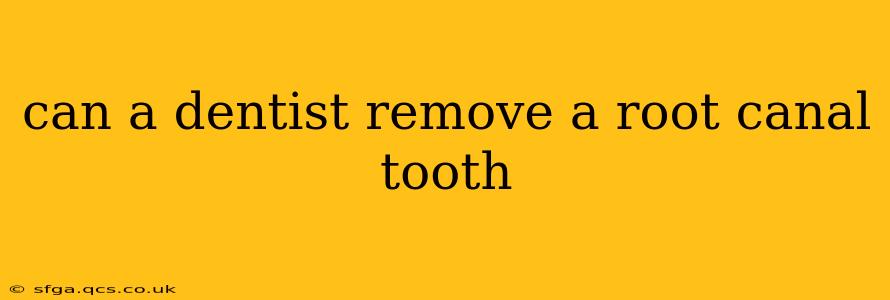Yes, a dentist can absolutely remove a tooth that has had a root canal. In fact, sometimes removing a tooth that's had a root canal is necessary. While a root canal aims to save a tooth, sometimes the procedure isn't enough, and extraction becomes the best option. This article will delve into the reasons why a root canal-treated tooth might need extraction and what the process entails.
Why Would a Dentist Remove a Root Canal Tooth?
Several reasons may lead a dentist to recommend removing a tooth that has undergone a root canal. These include:
-
Persistent Infection: Even after a root canal, infection can persist or recur. This can cause persistent pain, swelling, or the formation of an abscess. In these cases, extraction might be necessary to eliminate the source of the infection and prevent it from spreading.
-
Fractured Tooth: A tooth that has had a root canal can be more brittle and prone to fracturing, especially if it's already weakened or has a large filling. If a significant fracture occurs, making restoration impossible or impractical, extraction might be the solution.
-
Unsuccessful Root Canal: Sometimes, despite the best efforts, a root canal treatment fails to resolve the problem. This can be due to various factors, including undetected canals, perforation during the procedure, or the presence of resistant bacteria. If the tooth remains symptomatic after a retreatment attempt, extraction may be considered.
-
Tooth Resorption: This is the gradual loss of tooth structure, either internally (internal resorption) or externally (external resorption). Resorption can occur after a root canal, and if significant, may compromise the tooth's structural integrity, necessitating extraction.
-
Gum Disease (Periodontitis): Severe gum disease can damage the supporting tissues around the tooth, making it loose and unstable. Even a root canal-treated tooth might need to be removed if the periodontal disease is severe and irreparable.
What Happens During the Removal of a Root Canal Tooth?
The extraction process for a root-canal treated tooth is similar to the removal of any other tooth. The dentist will first numb the area with a local anesthetic to ensure your comfort. The extraction technique used will depend on the tooth's location, condition, and the dentist's assessment. Some teeth might require more complex surgical procedures compared to others.
Is it More Difficult to Remove a Root Canal Tooth?
The difficulty of extracting a root canal tooth is relative and dependent on multiple factors. While the root canal filling material itself doesn't significantly complicate the removal, other factors influence difficulty:
- Brittle Tooth Structure: A tooth already weakened from decay or fracture might break more easily during extraction.
- Curved or Narrow Roots: These root shapes can make it challenging to grasp the tooth firmly and extract it efficiently.
- Presence of Inflammation or Infection: This can make the extraction more complex and might require additional procedures.
Experienced dentists are well-equipped to handle such situations, minimizing the complexity and discomfort.
What are the Alternatives to Extraction?
Before recommending extraction, a dentist will explore alternative treatment options, if possible. These might include:
- Retreatment: If the root canal was unsuccessful, a dentist might attempt a retreatment to clean and refill the canals.
- Apicectomy: This surgical procedure removes the infected portion of the root tip.
- Crown placement (or re-crowning): To strengthen and protect a fractured tooth.
The best course of action will depend on individual factors and a comprehensive assessment by the dental professional.
Can I Avoid Needing a Root Canal Tooth Extracted?
Maintaining good oral hygiene, including regular brushing, flossing, and professional cleanings, is crucial. Regular dental checkups allow for early detection and treatment of problems, increasing the chances of saving a tooth even after a root canal. Prompt treatment of any dental issues is key to avoiding complications that might lead to extraction.
This information is for general knowledge and does not constitute medical advice. Always consult with a qualified dentist for diagnosis and treatment of any dental problems.
